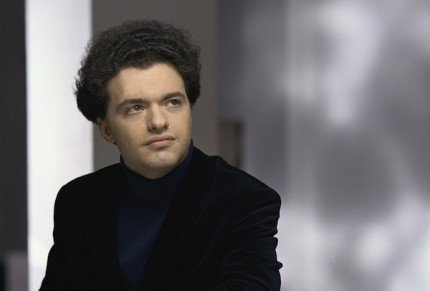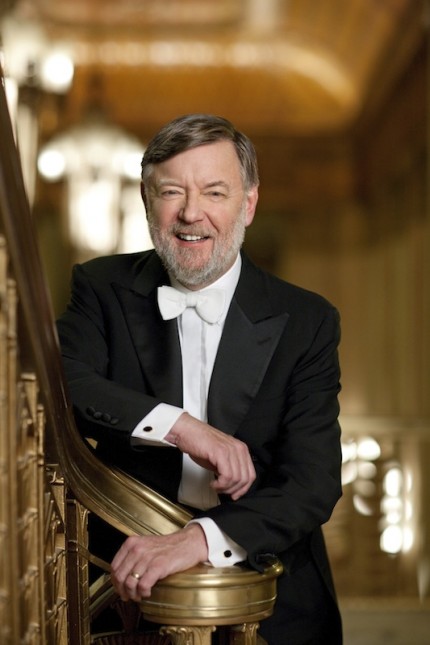Kissin brings fresh poetry to Tchaikovsky with Davis, CSO

Due to the vagaries of scheduling, Evgeny Kissin is playing only a single concert this week with the Chicago Symphony Orchestra, a one-off event led by Sir Andrew Davis Thursday night. The CSO will present a different program Saturday and Tuesday, and Kissin will be back next month for his annual Chicago recital.
Tchaikovsky’s Piano Concerto No. 1 is Kissin’s work of choice on his current U.S. tour. And despite its overwhelming familiarity, the celebrated Russian pianist managed to make Tchaikovsky’s inescapable warhorse emerge uncommonly fresh Thursday night.
As always with this artist, Kissin didn’t do anything particularly different or idiosyncratic with this music. Rather, his intelligence and subtle poetic sensibility consistently illuminated passages well worn by time, repetition and less thoughtful approaches.
The opening chords went with due power and impact, yet the pianist took the non troppo marking more seriously than many. At times his spacious approach and lingering rubato resulted in some disequilibrium with Davis’s accompaniment, yet for the most part the two proved admirable partners. In addition to Kissin’s polished fluidity, there was a natural spontaneity about his playing with even the first-movement cadenza seeming to breathe naturally.
That same flowing inevitability was manifest in the Andantino. Kissin showing unruffled professionalism in being undistracted by a cell phone’s repeated ringing in the hushed opening bars. One was struck by the delicacy and oragnic eloquence of Kissin’s playing; rarely will one hear the scherzando middle section contrasted with such playful charm.
With hard-charging accompaniment by Davis and the CSO, the finale was as exciting as one would expect, Kissin blazing through the octaves and runs up the keyboard while keeping a firm rein, skirting excessive speed or volume.
The loud ovations and curtain calls brought Kissin back on stage repeatedly, and the pianist was generous, filling out the short program with three encores, all by Tchaikovsky. He offered a supple and tender account of the Natha-valse, a buoyant Meditation and a lilting rendition of “December (Noël)” from The Seasons.
The first half offered kinda-sorta Tchaikovsky with the Divertimento from Stravinsky’s ballet, The Fairy’s Kiss. Stravinsky revered his older compatriot and drew on some lesser known music of Tchaikovsky for his 1928 ballet, later extracting four sections for the Divertimento.
The result is a winning confection, morphing Tchaikovsky melodies with Stravinsky’s harmonic and rhythmic ingenuity. While there are typically acerbic Stravinsky touches they never undermine the essential affection of this gracious homage.
While Chicago audiences know Davis primarily for his Lyric Opera work, the conductor is often just as inspired in orchestral programs. Such was the case here, with Davis drawing resplendent, multihued playing from the CSO musicians.
Even with the usual platoon of guest woodwinds, the playing was iridescent, jaunty and delightful, with especially fine contributions from clarinetist Stephen Williamson, flutist Mark Sparks (St. Louis Symphony principal), and oboist Elizabeth Koch Tiscione (Atlanta Symphony principal). The ebullient conductor was delighted with the results, shaking hands with the entire semicircle of front desk players and even making his way to the back to thank the basses as well.
Davis was an organ scholar at King’s College before taking up the baton, and his orchestral arrangement of the mighty Passacaglia and Fugue in C minor, BWV 582 opened the evening.
It’s hreatening to see that Bach transcriptions are no longer being read out of civilized society, and reappearing as occasional visitors to symphonic concerts. Though scored for large late Romantic forces—including four horns, piano, celesta, harp and percussion with two bass drums—Davis’s transcription is more piquant and restrained than brilliant or audacious in the Stokowski tradition, clarifying Bach’s counterpoint and leading to a majestic fugal coda. Davis’s retooling gives the woodwinds much of the best music and the three flutes were especially fine (Sparks, Jennifer Gunn and Tim Munro, formerly of eighth blackbird).
On another CSO flute note, Louise Dixon the CSO’s longtime section flute, retired from the orchestra earlier this month.
This program will not be repeated. James Feddeck conducts the CSO 8 p.m. Saturday and 7:30 p.m. Tuesday in Rachmaninoff’s Symphony No. 2 and Haydn’s Trumpet Concerto with soloist Christopher Martin. cso.org; 312-294-3000.
Posted in Uncategorized





